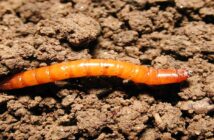A new herbicide with a wide application window and broad spectrum of weed control in variable weather conditions has already made its mark on UK farms, growers attending Cereals heard this morning.
Zypar was launched by Dow AgroSciences 12 weeks ago and in a difficult season has demonstrated how it rises to the challenges facing modern arable businesses.
For many farms a prolonged dry spell followed by rain and cold temperatures led to a dash with the sprayer to carry out T2 fungicide applications and late-season weed control.
Essex farmer Ed Ford said Zypar’s tank mix compatibility and the ability to apply up to growth stage 45 allowed him to grab windows in the weather to carry out his programme.
“We had hardly any rain for 12 weeks so the crops and the weeds were not growing,” said Ed, who farms 1,500 acres in partnership with his family at Childerditch.
“Then it rained and everything started to move extremely quickly so we had a lot of pressure on the sprayer to get everything done.
“Warm days were followed by cold nights and these conditions would usually not be ideal for effective weed control but we are pleased with how Zypar performed.
“The ability to spray late in the season was a big plus for us, and the fact it sat in the tank with our T2 fungicides.”
Ed was able to control a broad spectrum of weeds, namely cleavers, cranesbill, chickweed and mayweed.
“They all started to look yellow and sick within 48 hours so I knew quickly that it had worked and could move on to the next job,” Ed added.
Zypar is a co-formulation of Dow’s longstanding active florasulam – used in Spitfire – and Arylex active which was introduced to the market in Pixxaro EC last year.
Effective control in cold and variable temperatures is the hallmark of products from the Arylex active stable, and Zypar is no different.
“It cuts through those traditional limitations associated with other synthetic auxins,” says Dow’s cereal herbicide specialist Stuart Jackson.
“Providing sprayers can travel, growers can have complete confidence that Zypar will deliver really robust control.”
The contact-acting herbicide is expected to feature strongly this autumn because it can be applied with all residual herbicides such as pendimethalin and flufencet, bringing valuable control of a wide range of emerged broad-leaved weeds.
Zypar will also take out volunteer beans and manage high populations of cleavers, poppies and cranesbill before they start to seriously compete with crops and cause a yield penalty.
The new mode of action has added to Zypar’s appeal among growers with suspected or confirmed resistance to ALS chemistry in poppies and chickweed.
The liquid product is straight forward to use and does not require an adjuvant. Dose rates are from 0.75L/ha to 1.0L/ha, depending on weed size.




